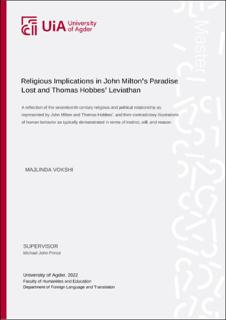| dc.description.abstract | This thesis aims to demonstrate the opposing religious and political standards in John Milton’s
Paradise Lost (1667) and in Thomas Hobbes’ Leviathan (1651). A comparison of the two
respective authors illustrates seventeenth-century responsiveness to the implicit religious and
political ideas of English authority at that time. This process unfolds itself through an
investigation of Milton and Hobbes’ opinions on human freedom, and how it should be
organized to maintain peace.
Following the English revolution, Milton and Hobbes witnessed a longing for a social
order. Milton expressed his solution to the problem as complete individual, freedom without
external interference from the state. Hobbes, on the contrary, believed that a concentration of
power in an absolutist sovereign is what will accommodate social welfare.
Further, an analysis of Milton’s epic poem, with its genesis of the first disobedience,
presents the deeply instinctual differences between Milton and Hobbes’ fundamental beliefs
about the natural human condition. A thorough examination of Milton’s religious ideology is
revealed through the poem’s characters Adam and Eve, and deals with the freedom of choice
that led them to Fall in the Garden of Eden. This perspective allows me to introduce the falling
nature of mankind that is established through Hobbes political doctrine in Leviathan. After
reviewing the relationship between the two seventeenth century philosophers, I was able to
formulate a conclusion based on the method that has the most promise for a safe performance
of human freedom, and of religion as politics. | |
